NOVEMBER 2024
From the Director
As we move forward into another month, I am pleased to update you on recent and upcoming events, as well as our ongoing initiatives aimed at advancing the frontiers of astrobiology.
NSF Science and Technology Center (STC) Proposal Development
Our work on the NSF STC proposal for The Center for Exploring Quantum Aspects of Life (CEQUAL) progresses steadily, with significant contributions from our diverse, interdisciplinary team. The CEQUAL seeks to pioneer quantum biology research, exploring how quantum coherence, entanglement, and optical information impact biological systems. With expertise from the University of Arizona, University of California Santa Barbara, Howard University, and international leaders like Japan’s National Institute for Materials Science, we are advancing a vision to revolutionize understanding of quantum mechanisms in life processes.
Welcoming a new Science Program Manager in Early 2025
Dr. Adrienne Vancura, an accomplished RNA biologist with over a decade of research experience at top institutions like Harvard and MIT, will be joining the Arizona Astrobiology Center as the new Science Program Manager. She will lead interdisciplinary research initiatives exploring life's origins in this role, specifically focusing on the RNA World Hypothesis. Dr. Vancura's extensive experimental and computational biology background will be invaluable as she oversees project development, mentors emerging scientists, and coordinates outreach to bridge scientific insights with diverse audiences.
NASA ICAR Proposal
Our team continues to make substantial progress on the NASA ICAR proposal. This initiative focuses on expanding our research capabilities and exploring new astrobiological frontiers, aiming to align our work with NASA’s strategic priorities in planetary science and the search for life. With this proposal, we seek to further integrate interdisciplinary research approaches to address critical questions about life's origins and persistence in diverse planetary environments.
RFI Response Coordination for NASA-DARES 2025
In addition, we recently hosted a luncheon to discuss NASA’s forthcoming Decadal Astrobiology Research & Exploration Strategy (NASA-DARES 2025), introduced at the November 8th Town Hall. This session was an opportunity for our community to align on a coordinated response to NASA’s Request for Information (RFI), which seeks insights from the astrobiology community to shape NASA’s strategic directions. We encourage all interested members to participate in the RFI process, available through NSPIRES, to ensure that UA’s expertise contributes to guiding NASA’s next decade in astrobiology research.
International Engagement and CNRS Meeting
On October 23rd, we presented our latest astrobiology insights at the CNRS-University of Arizona Presidential Meeting. Our session, “OSIRIS-REx, Astrobiology, and France,” highlighted key achievements from the OSIRIS-REx mission and expanded on interdisciplinary research linking the origins of life to neural systems. Our team members, including Corey Knox and Christopher Hamilton, showcased our work with French collaborators to strengthen UA-AMU (Aix-Marseille University) connections in astrobiology. This meeting underscores our commitment to fostering international collaborations that amplify research on planetary habitability and life’s origins.
Celebrations and Recognitions
This past month also saw special recognitions within our center. We warmly congratulate Regis on receiving the “Ordre National du Mérite” from the French government, honoring his contributions to international scientific cooperation. His award presentation by CNRS President Dr. Antoine Petit was a memorable event, celebrating Regis’s dedication to cross-national partnerships that enrich both astrobiology and broader scientific pursuits.
Outreach and Engagement
Our October Astrobio Lounge, featuring Dr. Chris Impey’s Sci-Fi Movie Night, created a lively exchange on astrobiology themes, this time inspired by Don’t Look Up. These gatherings bring our community together, fostering dialogue that bridges science and culture. In November, we’ll continue this series with discussions that further engage public interest and educational outreach.
Thank you to all team members, partners, and supporters whose dedication drives the Arizona Astrobiology Center’s mission forward. Let’s continue to work together to unravel the mysteries of life and consciousness, advancing our understanding of habitable environments across the cosmos.
With appreciation and anticipation,
Dante Lauretta
Director, Arizona Astrobiology Center
SACNAS NDiSTEM Conference
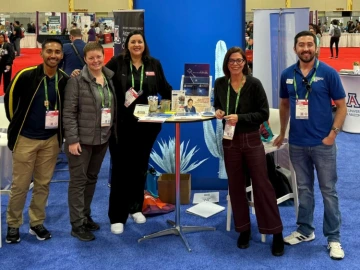
The Arizona Astrobiology Center (AABC) had the opportunity to participatee in the 2024 SACNAS NDiSTEM Conference, held in Phoenix, AZ, from October 31 to November 2. AABC was one of the 12 in-person units (20 total) representing the University of Arizona in the 20x20 booth during this remarkable event, which brought together 6,000 attendees.
SACNAS (Society for the Advancement of Chicanos/Hispanics and Native Americans in Science) - NDiSTEM (National Diversity in STEM)
SACNAS’ NDiSTEM Conference is the largest multidisciplinary and multicultural STEM diversity event in the country. This premier gathering equips, empowers, and energizes participants for their academic and professional journeys in STEM. Over the course of the event, attendees—ranging from college students to seasoned professionals—engaged in cutting-edge STEM research presentations, professional development workshops, inspiring keynote addresses, and the Academic & Career Expo. The conference also featured multicultural celebrations, traditions, and an inclusive community of peers, mentors, and role models.
The NDiSTEM Conference is a uniquely inclusive space that encourages and empowers individuals to bring their whole selves to STEM, fostering a vibrant environment of diversity, innovation, and collaboration.
Utterback Middle School Visit
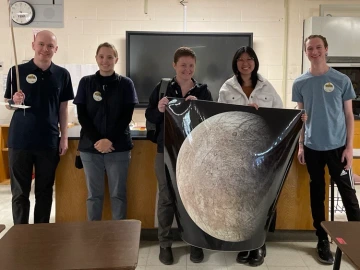
On November 8th, the Arizona Astrobiology Center visited Utterback Middle School, where our Astrobiology Ambassadors facilitated exciting interactive activities about Europa and the Europa Clipper mission.
Ambassadors designed an engaging, hands-on experience to introduce over 80 middle students and their teachers to astrobiology concepts, with a special focus on Europa’s potential for life. One of the highlights of the lesson was the "Europa Fly By" Bingo activity.
Guest Speaker: Dr. Melissa Morris
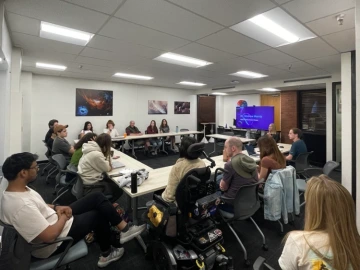
On Thursday, November 14, Dr. Melissa Morris visited the Arizona Astrobiology Center as a guest speaker, sharing her career journey into NASA. With over seven years of experience in NASA’s Planetary Science Division, Dr. Morris currently serves as the Program Executive for the OSIRIS-REx asteroid sample return mission, the OSIRIS-APEX mission, and the Hyabusa2 and Hyabusa2# missions. She is also the Program Scientist for the VIPER mission and has previously led key initiatives such as the Emerging Worlds program, the PSD Early Career Award program, and served as Deputy Program Scientist for OSIRIS-REx. Dr. Morris’s talk offered insights into her work, encouraging attendees to explore their own pathways in planetary science, astrobiology and space sciences.
Getting to Know AABC Members
Karla Paredes Aguilar: What Got Me Interested in Astrobiology
Arizona Astrobiology Center member Karla Paredes Aguilar (College of Science, University of Arizona) discusses her astrobiology and planetary sciences pathway.
Interested in Hosting an Event at AABC?
Contact us: astrobio@arizona.edu
OCTOBER 2024
From the Director
Dear Colleagues and Friends of the Arizona Astrobiology Center,
As October unfolds, I am delighted to reflect on the remarkable progress we’ve made at the Arizona Astrobiology Center (AABC). This month, our team achieved a significant milestone with the submission of our Step-1 proposal to NASA’s ICAR (Interdisciplinary Consortia for Astrobiology Research) program. This proposal, titled Astrobiology in Carbonate-Rich Aqueous Environments, seeks to answer one of astrobiology’s most compelling questions: how the chemical evolution of carbonate-phosphate-rich aqueous environments contributes to our understanding of life’s origins, persistence, and habitability.
In addition, we are excited to announce that the AABC is spearheading an effort to propose a Science and Technology Center (STC) to the NSF, focusing on the intersection of quantum mechanics and biological systems. Our vision for this STC is to explore the quantum origins of life and biological processes, a cutting-edge research frontier that could transform our understanding of life's fundamental mechanisms. At a recent Astrobiology Luncheon, we discussed the initial framework of this proposal and are now inviting the broader community to contribute ideas and expertise. Specifically, we are looking for innovative research concepts, interdisciplinary collaborations, educational programs, and resource needs that align with this groundbreaking initiative. If you are interested in contributing, please send your ideas to me by October 19.
At the AABC, we’re not only fostering groundbreaking research but also cultivating a vibrant community through our Astrobiology Lounge. This month, we’ve had a series of exciting events, starting with our Board Game Night, which brought together faculty, students, and staff for an evening of fun, strategic thinking, and camaraderie, strengthening the bonds within our astrobiology community. At Movie Night we screened Interstellar, followed by an engaging discussion with Erika Hamden about the film's scientific themes and the portrayal of space exploration. Please see the announcement below for our next Movie Night coming up on October 17th. We also hosted an Art Night, encouraging creativity and a different perspective on science through visual expression. We look forward to continuing these activities as part of our commitment to building a collaborative and dynamic environment.
I also want to take a moment to recognize the incredible achievement of the Hera mission team, which successfully launched this month. Watching the launch brought back memories of the OSIRIS-REx mission's early days—the emotions, the anticipation, and the extraordinary teamwork required to make it a reality. The Hera mission is a pivotal project for both the small body community and planetary defense. The excitement of witnessing Hera's launch is amplified by the mission’s potential to deliver groundbreaking insights into binary asteroids.
As we continue to push the frontiers of planetary science and astrobiology, I encourage all members of our community to remain engaged in these exciting projects. Whether it’s through contributing to the NSF STC proposal or advancing our research with missions like
Hera, we are at the forefront of discoveries that will shape our understanding of life and our universe.
Take care,
Dante Lauretta
Director, Arizona Astrobiology Center
Sci-Fi Movie Night! with Dr. Erika Hamden
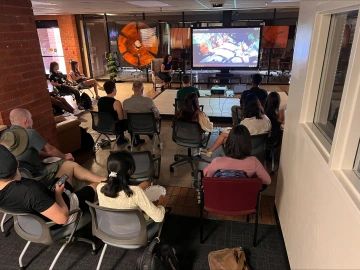
Dr. Erika Hamden recently led a dynamic discussion on the film Interstellar, guiding us through an exploration of some pre-selected clips. The event brought together a diverse group of guests, including faculty, staff, and friends from various departments across the University of Arizona. The discussion was lively, with engaging questions from the audience, and Dr. Hamden’s insightful commentary deepened our understanding of the science and themes within the movie. It was an inspiring and thought-provoking event, fostering connections and curiosity among attendees.
Astrobio Lounge - Art Night!
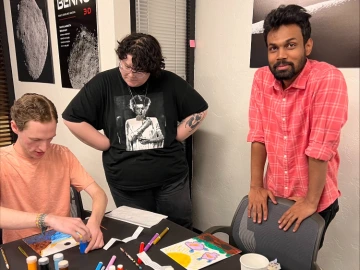
Astrobio Art Night was a creative and inspiring success! Led by Astrobiology Ambassador CJ Smith, participants were invited to imagine life in extreme environments through art. The event focused on extremophiles—organisms that thrive in the harshest conditions on Earth—sparking curiosity and creativity. Guests engaged in hands-on art projects, translating scientific concepts into vibrant visual pieces. The night was filled with laughter, learning, and some truly amazing artworks, making it a memorable experience for everyone involved.
AABC Members Cross-departmental faculty networking and professional development meeting
On Wednesday, October 9, we held a productive members meeting with the primary focus on developing a proposal for the National Science Foundation’s (NSF) Science and Technology Centers (STC) program. Colleagues from across campus joined the discussion, expressing interest in contributing to this exciting initiative. We discussed potential partnerships with organizations such as Google Quantum AI and Kyushu University to enhance our research capabilities and broaden the scope and impact of our proposal. The collaboration and enthusiasm in the room were palpable, setting the stage for a strong and innovative proposal submission.
Getting to Know AABC Members
This month we introduce Dr. Tyler Robinson & Ph.D. Student Sawsan Wehbi
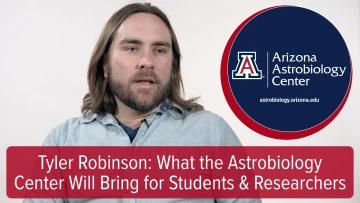
Tyler Robinson: What the Astrobiology Center Will Bring to Students & Researchers
Arizona Astrobiology Center member Tyler Robinson (Lunar and Planetary Laboratory, University of Arizona) introduces himself and tells us what the AABC will bring to students and researchers on campus and beyond. Link to video
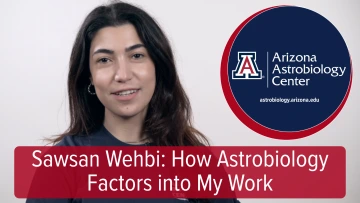
AABC’s Sawsan Wehbi: How Astrobiology Factors into My Work
Arizona Astrobiology Center member Sawsan Wehbi (Genetics Graduate Interdisciplinary Program, University of Arizona) introduces herself and tells how astrobiology factors into her work. Link to video
